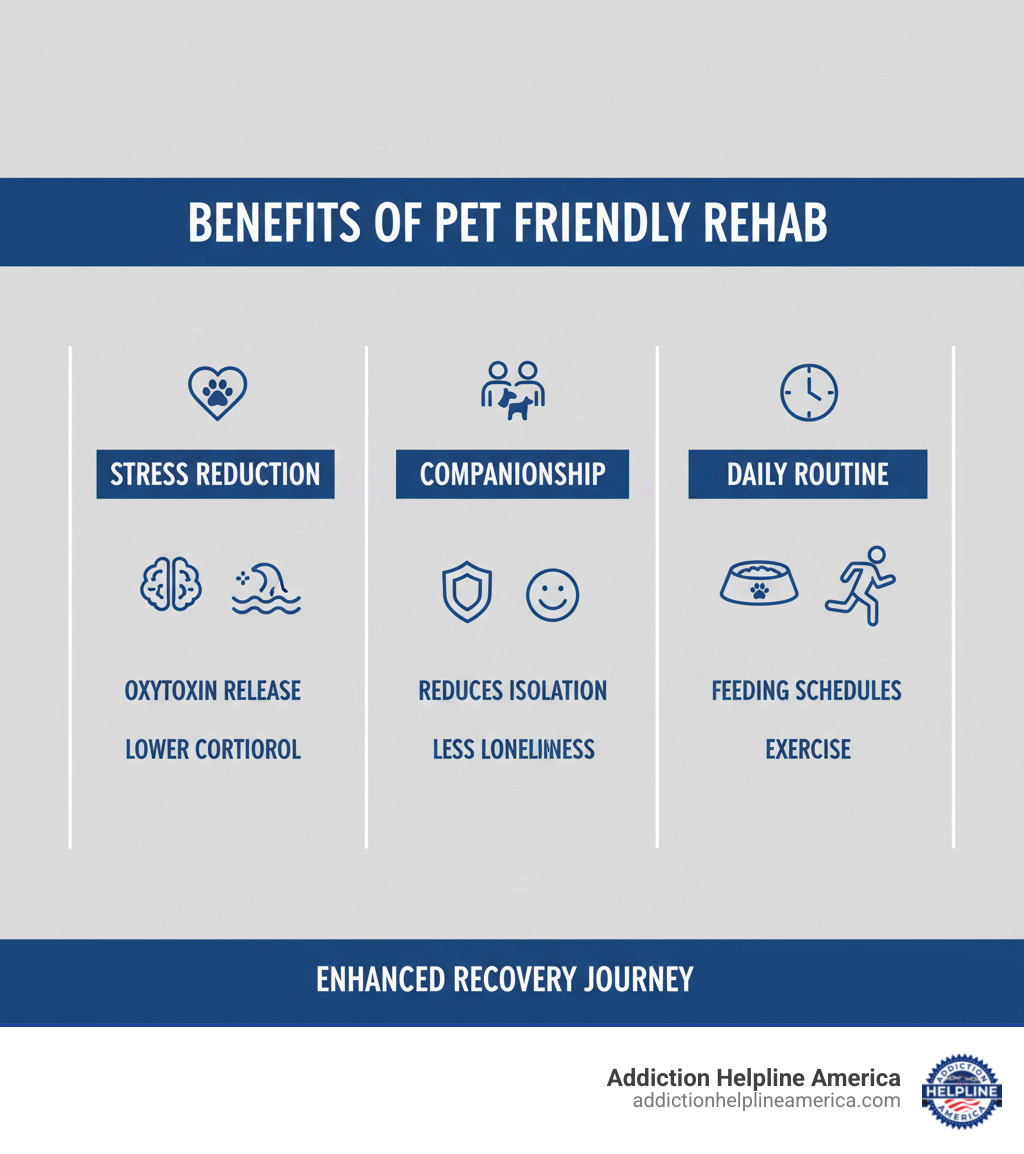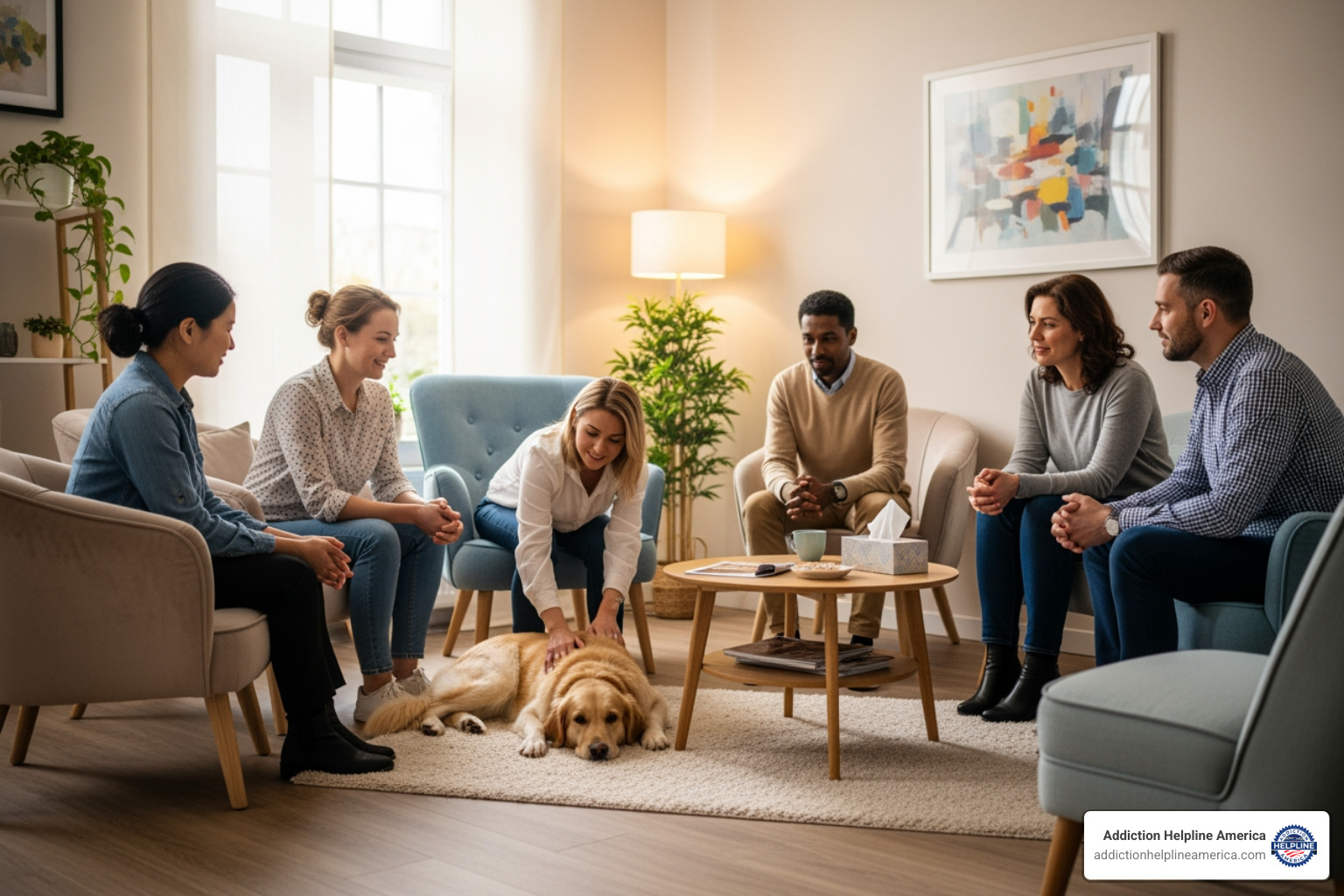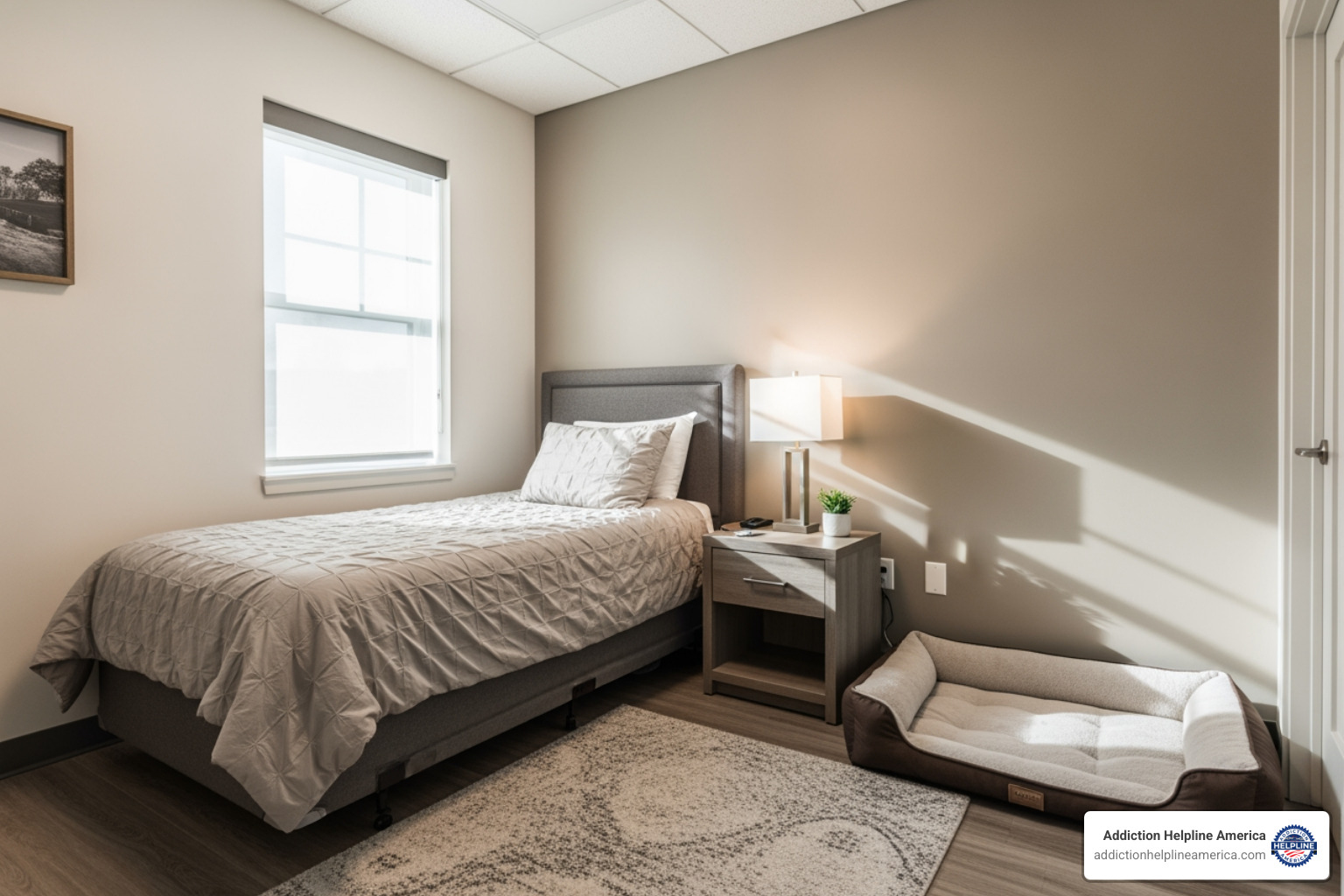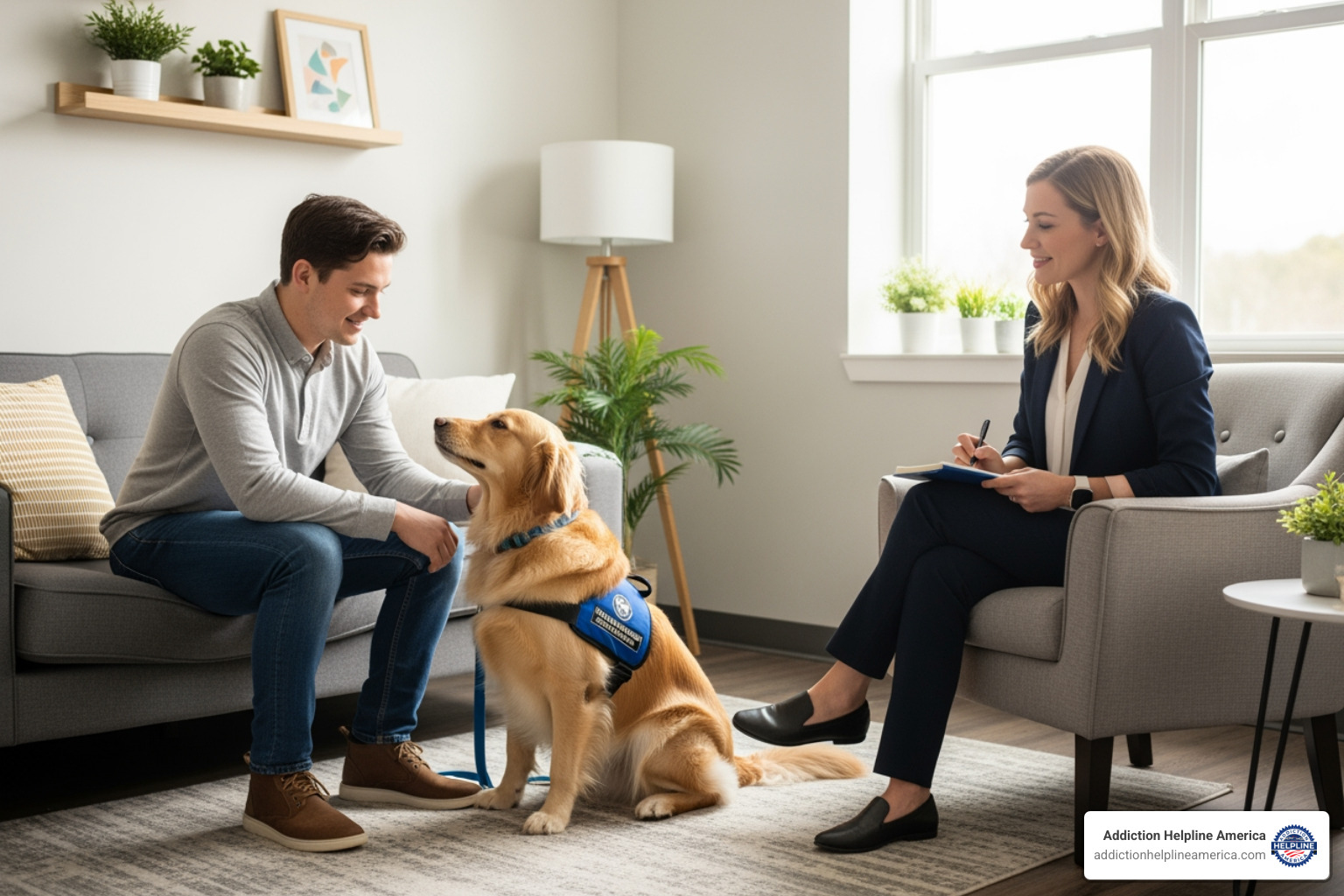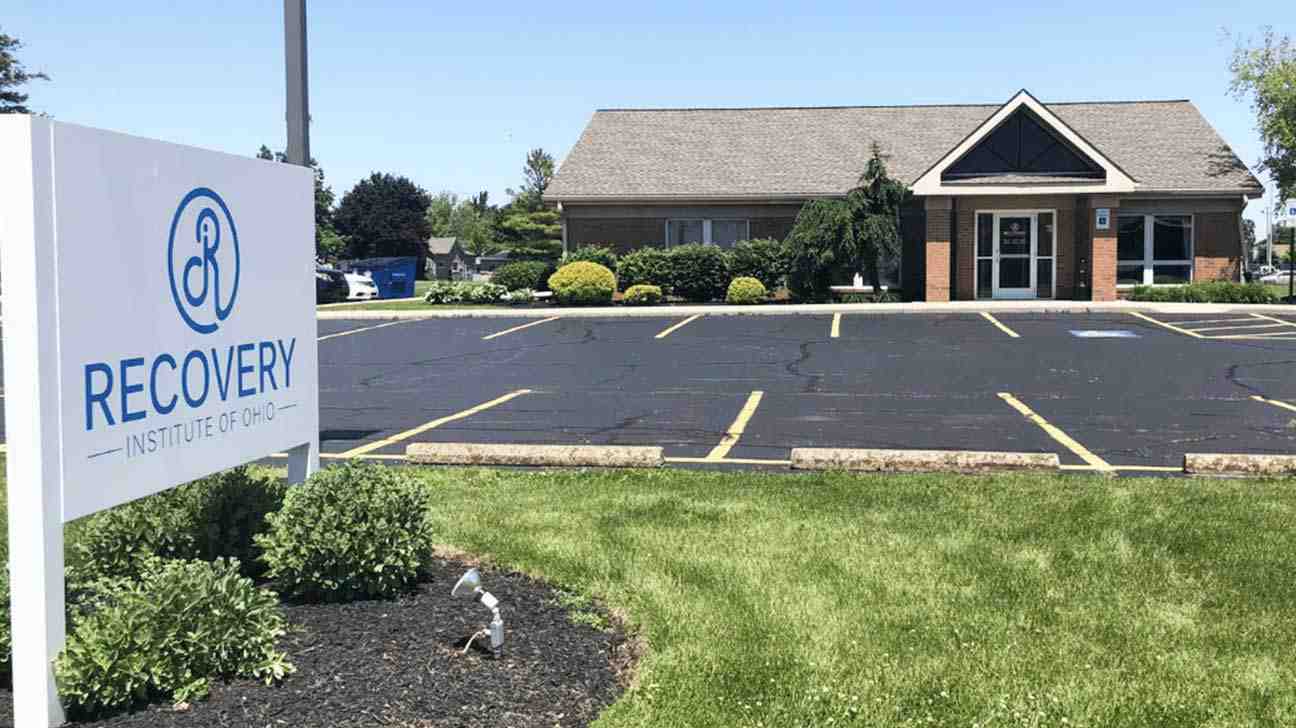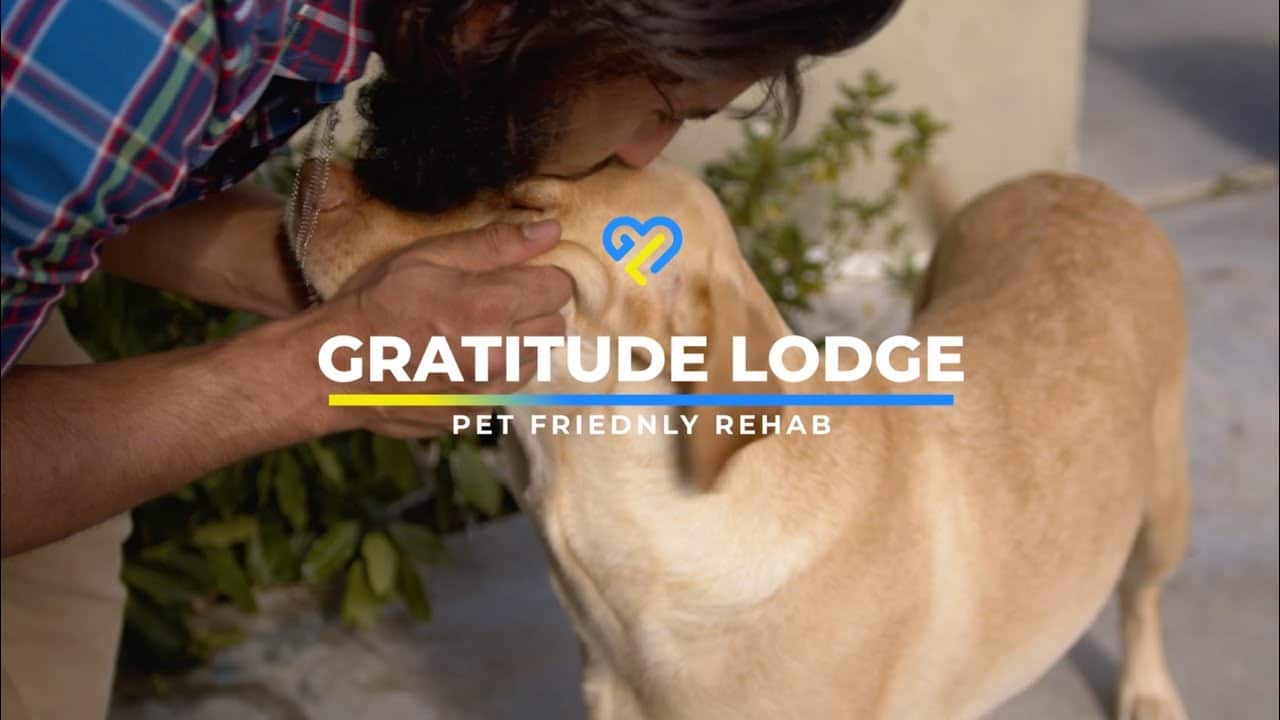
Why Pet Friendly Rehab Is a Game-Changer for Your Recovery Journey
Pet friendly rehab programs allow individuals seeking addiction treatment to bring their beloved companion animals with them during recovery. Here’s what you need to know:
Quick Answer: What is Pet Friendly Rehab?
- What it is: Treatment facilities that permit clients to bring pets (typically dogs and cats) during inpatient or residential addiction treatment
- Who it’s for: Anyone whose pet provides crucial emotional support and who might delay treatment rather than leave their animal behind
- What’s required: Up-to-date vaccinations, health records, good behavior, and owner responsibility for all pet care
- Key benefits: Reduced stress and anxiety, emotional support, personal responsibility, decreased loneliness, and improved treatment outcomes
For many, leaving a pet behind is a major barrier to addiction treatment—95% of pet owners can’t imagine giving up their pets for any reason. Fortunately, a growing number of centers recognize that the human-animal bond can improve recovery. These pet friendly rehab programs understand that your pet is family and integrate them into your treatment journey, allowing you to focus on healing without the worry of abandoning your companion.
Research shows that 74% of pet owners reported mental health improvements from pet ownership, making pets valuable allies in the fight against addiction. At Addiction Helpline America, we help people find pet-friendly rehabs that honor this important bond. Removing barriers like pet care concerns can be the difference between seeking help today or continuing to struggle alone.
Terms related to Pet friendly rehab:
The Science-Backed Benefits of Pets in Addiction Recovery
Recovery is hard, but your pet is more than just emotional support—they are a powerful, science-backed therapeutic tool. When you bring your pet to pet friendly rehab, you tap into the unconditional love and companionship that can significantly improve your well-being, reduce stress, and help you develop healthier coping strategies.
Many facilities now accept pets as part of a holistic healing approach, and the numbers speak for themselves: 74% of pet owners report mental health improvements from pet ownership. In a rehab setting, your pet can ease the emotional turmoil of withdrawal and early recovery, creating space for deeper therapeutic work to happen.
How Pets Reduce Stress and Anxiety
Stress and anxiety are major relapse triggers. Interacting with a pet is a proven way to combat them. Petting an animal releases oxytocin (the “love hormone”), which promotes calm and connection, while simultaneously lowering levels of cortisol, the body’s main stress hormone.
This provides the same feel-good chemicals your brain was craving, but in a healthy, sustainable way. Your pet’s calming presence can make the difficult first weeks of detox and therapy more manageable, offering unconditional love when you need it most. The American Heart Association has researched this connection, which you can learn more about in their article on the link between pets and mental health.
Building Routine and Personal Responsibility
Addiction often destroys structure and self-worth. Caring for a pet rebuilds it. Daily responsibilities like feeding, walking, and playing create a natural routine that supports your recovery. Your dog needs breakfast, and your cat’s litter box needs cleaning, providing lifelines of purpose on difficult days.
This daily structure becomes automatic. Taking care of your pet reminds you that you can be reliable and trusted. That sense of purpose and self-worth grows with every meal and every walk, creating accountability wrapped in unconditional love.
Alleviating Loneliness and Creating a Sense of Home
Rehab can feel lonely and isolating. A pet transforms a clinical room into a home, providing constant companionship without judgment. They don’t care that you’re in rehab; they just know you’re together. This creates a bridge between your old life and your new one, helping you maintain your identity.
For many, a pet is family. Having them close provides a sense of normalcy that makes the experience less overwhelming. You’re not just a patient; you’re still you—a person with a beloved companion who needs you. Research shows how powerful this bond is, as detailed in this article on the power of pets against loneliness.
What to Expect from a Pet Friendly Rehab Program
Choosing a pet friendly rehab means you don’t have to leave your companion behind. However, these programs have specific guidelines to ensure a safe and healing environment for all clients and their pets. You’ll receive the same evidence-based care as a traditional program, but with your pet by your side.
Understanding these expectations ahead of time helps ensure a smooth transition for both you and your pet. You’ll be part of a community where mutual respect is essential for everyone’s recovery journey.
Common Policies and Requirements for Your Pet
Before admission, it’s crucial to call the facility and clarify their rules. Here’s what most centers require:
- Pet types allowed: Most facilities accept dogs and cats. Exotic animals or small caged pets are rarely permitted due to safety and allergy concerns.
- Size and weight limits: Many centers have weight limits (often around 60 pounds) to ensure manageability in shared spaces. Some larger facilities may accommodate bigger breeds.
- Breed restrictions: Breed restrictions for dogs like Pit Bulls or Rottweilers are common, often due to insurance policies. You can learn more about breed-specific legislation to understand why these policies exist.
- Vaccination records: Proof of current vaccinations (rabies, distemper, etc.) is non-negotiable to protect all residents and pets.
- Health screening: A recent health certificate from a vet is required, confirming your pet is healthy and free of parasites like fleas and ticks.
- Temperament assessment: Your pet must have a calm, non-aggressive temperament and be comfortable around strangers and other animals.
Accommodations and Amenities
Pet friendly rehab facilities are designed to make both you and your companion comfortable.
- Private rooms: Most programs offer private rooms, giving you and your pet a secure personal space.
- Designated outdoor areas: Facilities typically provide designated outdoor areas, such as enclosed yards or walking trails, for exercise and bathroom breaks.
- Pet hygiene facilities: Amenities may include pet hygiene stations for grooming and cleanup, with waste disposal provided.
These amenities are essential components that allow your pet to thrive while you focus on recovery.
Your Responsibilities as a Pet Owner in Rehab
Bringing your pet to rehab means you are still their primary caregiver. This responsibility is a therapeutic part of your recovery, helping to build accountability and structure.
- Daily care: You are fully responsible for all daily care, including feeding, watering, and administering medications.
- Exercise and walks: Regular walks and exercise are your responsibility and a built-in, stress-relieving part of your recovery routine.
- Cleaning up after your pet: You must clean up after your pet in all areas to maintain a hygienic environment for everyone.
- Supervision: Your pet must be supervised at all times. They should be leashed outdoors and secured in your room during therapy sessions.
- Ensuring no disruption to others: Your pet’s behavior must not disrupt other residents. Excessive barking or aggression can interfere with the healing of others and may not be tolerated.
Animal-Assisted Therapy, ESAs, and Service Animals in Rehab
When exploring pet friendly rehab, it’s important to understand the difference between personal pets, Emotional Support Animals (ESAs), and Service Animals. Each has a different role and different legal protections in a treatment setting.
The role of animals in addiction treatment goes far beyond simple companionship. From structured therapeutic interventions to legal rights, each category serves a unique purpose.
What is Animal-Assisted Therapy (AAT)?
Animal-Assisted Therapy (AAT) is a formal, goal-directed treatment where a licensed therapist uses a specially trained animal in sessions. AAT is used to help clients build empathy, regulate emotions, and reduce anxiety, making them more receptive to therapy. It is a clinical intervention, distinct from simply having a personal pet present. Studies show that AAT, when combined with therapies like CBT, can improve life skills and reduce impulsiveness, especially for those with co-occurring disorders.
A Pet Friendly Rehab’s Approach to ESAs vs. Service Animals
Facilities and the law treat personal pets, Emotional Support Animals (ESAs), and Service Animals differently. Here’s a breakdown:
| Feature | Service Animal | Emotional Support Animal (ESA) | Personal Pet |
|---|---|---|---|
| Legal Protections | Americans with Disabilities Act (ADA) – public access | Fair Housing Act (FHA) – housing accommodation | No specific federal legal protection for public access |
| Required Training | Individually trained to perform specific tasks for a disability | No specific training required, only a letter from a licensed mental health professional | No specific training required beyond basic obedience |
| Role in Rehab | Performs tasks directly related to the owner’s disability; integral to daily functioning | Provides comfort and emotional support to alleviate symptoms of a mental health condition | Offers companionship, emotional support, and routine; improves comfort |
Legal Rights for Service Animals in Treatment
Service animals have strong legal protections under the Americans with Disabilities Act (ADA). They are not pets but medical aids trained to perform specific tasks related to a disability. A rehab facility must provide reasonable accommodations and can only ask two questions: if the animal is required for a disability and what task it performs. They cannot ask for documentation or require the animal to demonstrate its task.
Your service animal must be housebroken, under your control at all times, and not pose a direct threat to others’ health or safety. While your right of access is legally protected, facilities may still evaluate a service animal’s temperament on a case-by-case basis. We can help you find facilities that respect your legal rights and understand your animal’s vital role in your recovery.
How to Find the Right Pet Friendly Rehab for You
Finding the right pet friendly rehab is easier when you know what to look for. Focus on a program’s pet policies, treatment offerings, accreditation, and costs to find a center where both you and your companion can thrive. Addiction Helpline America offers free, confidential guidance to help you steer this process and connect with quality treatment centers across the United States.
Step 1: Confirm Specific Pet Policies
Never assume a “pet-friendly” label covers your situation. Call the admissions team to confirm specifics. Ask about accepted pet types, size or breed restrictions, required documentation (vaccinations, health certificates), and any fees or deposits. Getting clear on these rules prevents surprises and ensures you are properly prepared.
Step 2: Evaluate the Treatment Programs Offered
Your recovery is the priority. Ensure the facility offers the clinical care you need. Look for essential services like medical detox, inpatient or residential care, and dual diagnosis treatment for co-occurring mental health conditions. Also, inquire about their therapeutic approaches, such as Cognitive Behavioral Therapy (CBT) and Dialectical Behavior Therapy (DBT). For continuing care, our guide to sober living that allows pets can be a helpful resource.
Step 3: Check for Accreditation and Licensing
Accreditation is your assurance of quality and safety. Verify that the facility has proper state licensing. Top-tier centers will also have accreditation from bodies like the Joint Commission (JCAHO) or CARF (Commission on Accreditation of Rehabilitation Facilities), which signifies a commitment to high national standards of care. These credentials give you confidence that you will be in capable, caring hands.
Step 4: Prepare Your Pet for the Transition
A smooth transition for your pet helps them support you better. Prepare ahead of time to set you both up for success from day one.
- Gather veterinary records: Collect all necessary vet records, including vaccination history and health certificates, well in advance of admission.
- Pack familiar items: Bring enough of their regular food, along with familiar toys, bedding, and any medications to provide comfort and avoid disruption.
- Ensure good behavior: Your pet should be well-behaved and comfortable around strangers. Practice basic obedience and socialization, as they will be in a communal living environment. Be honest with admissions staff about any behavioral concerns.
Frequently Asked Questions about Pet-Friendly Rehab
Choosing a pet friendly rehab involves planning for both yourself and your companion. Here are answers to the most common questions we receive.
What types of pets are usually allowed in a pet friendly rehab?
Most facilities accept dogs and cats. Be aware that size, weight, and breed restrictions are common. Smaller caged animals may be considered on a case-by-case basis, but exotic pets are almost never allowed. Always call the facility to confirm their policy for your specific pet.
Am I still responsible for my pet’s care during treatment?
Yes, you are fully responsible for your pet’s care, including feeding, walking, grooming, and cleaning. This responsibility is a therapeutic tool that helps rebuild routine, accountability, and purpose during your recovery. You must also ensure your pet is supervised and does not disrupt other residents.
Are there extra costs associated with bringing a pet to rehab?
Yes, expect extra costs. Facilities may charge a one-time pet fee or a refundable deposit. You are also responsible for all ongoing expenses, including food, supplies, and any veterinary care your pet may need during your stay. Ask the admissions team for a full breakdown of pet-related costs upfront to avoid financial stress.
At Addiction Helpline America, we can help you steer these conversations and find a pet friendly rehab that fits both your clinical needs and your budget. We’re here to ensure you have all the information you need to make the best decision.
Conclusion: Take the First Step with Your Loyal Companion
Deciding to seek help is a courageous step. For pet owners, the fear of leaving a companion behind can be a major barrier. Pet friendly rehab programs eliminate this barrier, recognizing that your pet is family and a powerful tool for healing.
The science is clear: pets reduce stress, build routine, and combat loneliness, leading to better treatment outcomes. Caring for your pet in rehab reinforces your capacity for responsibility and love, which is powerful medicine for rebuilding your life.
Addiction Helpline America helps people nationwide find programs that honor this bond. We provide free, confidential, personalized guidance to connect you with a pet friendly rehab that fits your clinical and financial needs. We know that finding the right fit is crucial, and we’re here to help you find a program where both you and your four-legged family member are welcome.
Your path to lasting recovery doesn’t have to be walked alone—and it doesn’t have to mean leaving your pet behind. For personalized guidance in finding a treatment program that fits your unique needs, including pet friendly rehab options, explore our comprehensive guide to types of treatment programs.
Your journey to healing, with your loyal companion by your side, can start today.
Our helpline is 100%
free & confidential
If you or someone you care about is struggling with drug or alcohol addiction, we can help you explore your recovery options. Don’t face this challenge alone—seek support from us.
Programs
Resources
Will my insurance
cover addiction
treatment?
We're ready to help
Find the best
drug or alcohol treatment
center
Are you or a loved one struggling with addiction? Call today to speak to a treatment expert.

